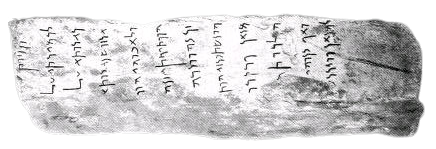In a few words ,because it is an obscure dialect, very poorly attested.
People can be become obsessed these with 'the language of Jesus' . You can see that all over the web.
There are articles,posts,videos all over the internet with pompous titles about 'the language of Jesus Christ' ,the 'Lord's Prayer in Galilean Aramaic'- the dialect Jesus spoke-,'Jesus Christ's Aramaic lives on' and many other titles of the like.
But such claims are an overstatement out of place and out of time. I will try to explain some facts about the Aramaic language and Jesus's native Galilean Aramaic dialect.
Aramaic -not one but hundreds of dialects.
First off Aramaic in not one monolithic language unchanged through time. Every language undergoes many changes from the moment it appears. In time it changes in vocabulary,grammar, pronunciation ,it breaks up into dialects some of which evolve into new languages and so forth.
The same goes for Aramaic. It has changed a lot since it first appeared in the ancient kingdom of Aram around the city of Edessa. It broke up into two major dialectal branches ,Eastern and Western from which in turn broke off many dialects/languages.
You cannot expect that Aramaic has remained one and the same from the 11nth century BCE since it is thought to have first appeared among the Arameans til modern days.
So,when you hear about Aramaic you need to ask yourself what Aramaic? what dialect? what time?
What language did Jesus speak?
It is agreed by linguists and historians that Yeshua Mshiha, Jesus Christ spoke Aramaic as his mother tongue along with all Jews of time whose spoken language had shifted from Hebrew to Aramaic since their exile in Babylon.
His dialect was Galilean Aramaic spoken in the region of Galilea.
Galilean Aramaic was different from the dialect spoken in Jerusalem.
It belonged to the Western Aramaic branch while Jerusalem Aramaic belonged to the Eastern Aramaic branch.
Galilean had many differences from Jerusalem Aramaic.
It was heavily influenced by Greek -a language of prestige at the time- to the point that even its phonology had changed having Greek like features like the loss of of guttural and ejective sounds-typical of Semitic languages unlike its Jerusalem relative. That indicates that speakers of Galilean Aramaic were bilingual in Aramaic and Greek. A Galilean speaker would stick out in Jerusalem. His accent would immediately give him away.
The original Lord's Prayer in Aramaic.
There is no such thing as the Lord's Prayer in Galilean Aramaic.
The 'original' Lord's Prayer in Aramaic most of the time is in Syriac Aramaic. There is no such thing as the Lord's Prayer in Galilean. Not in it's original form anyway. Even the Syriac version is not the original since it's a translation from Greek.
There are though reconstructions of the Lord's Prayer in Galilean Aramaic but these are subject to future modifications since they are a reconstruction.
Why you cannot learn the language of Jesus Christ.
Because Galilean is an obscure, very poorly attested dialect. It is in the process of being reconstructed by linguists during the last 50 years by comparison with changes in other Aramaic dialects, living or dead.
